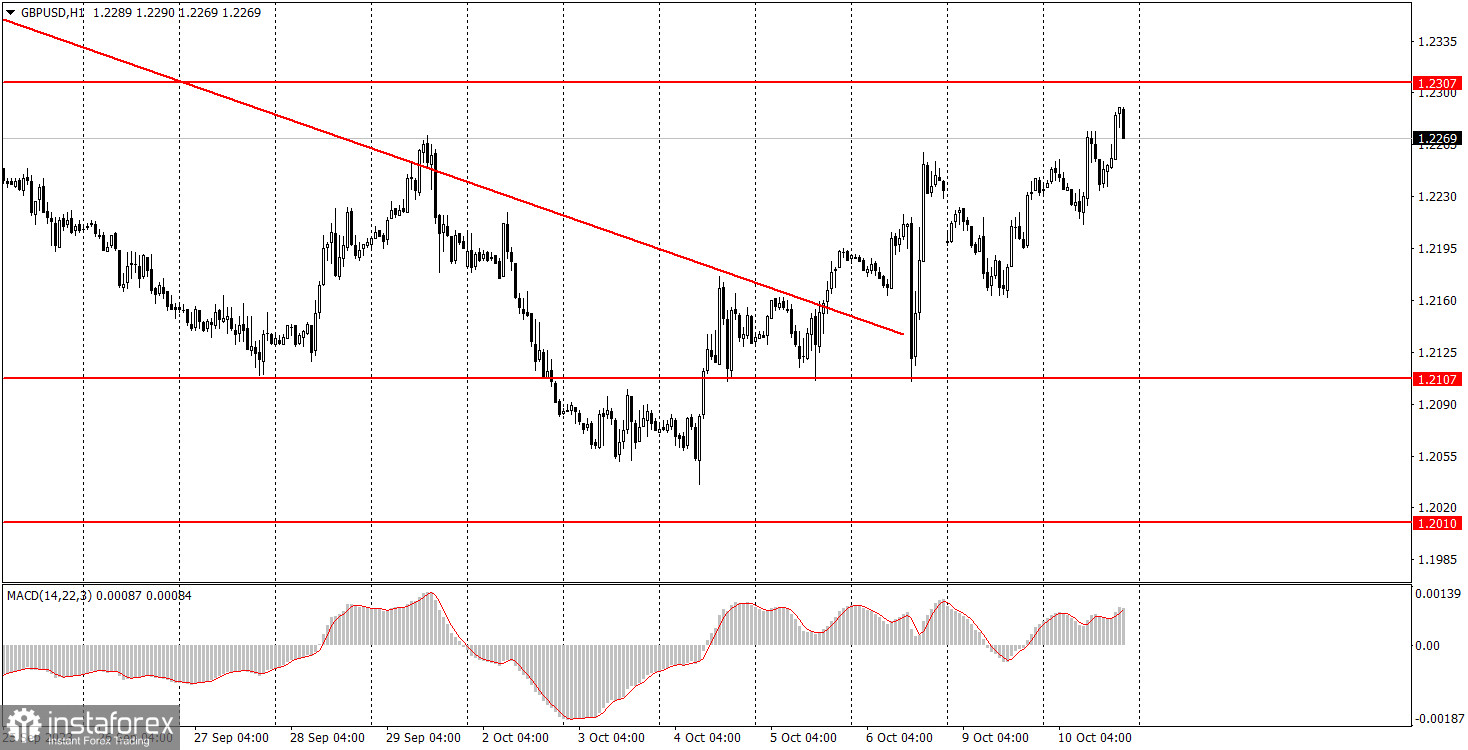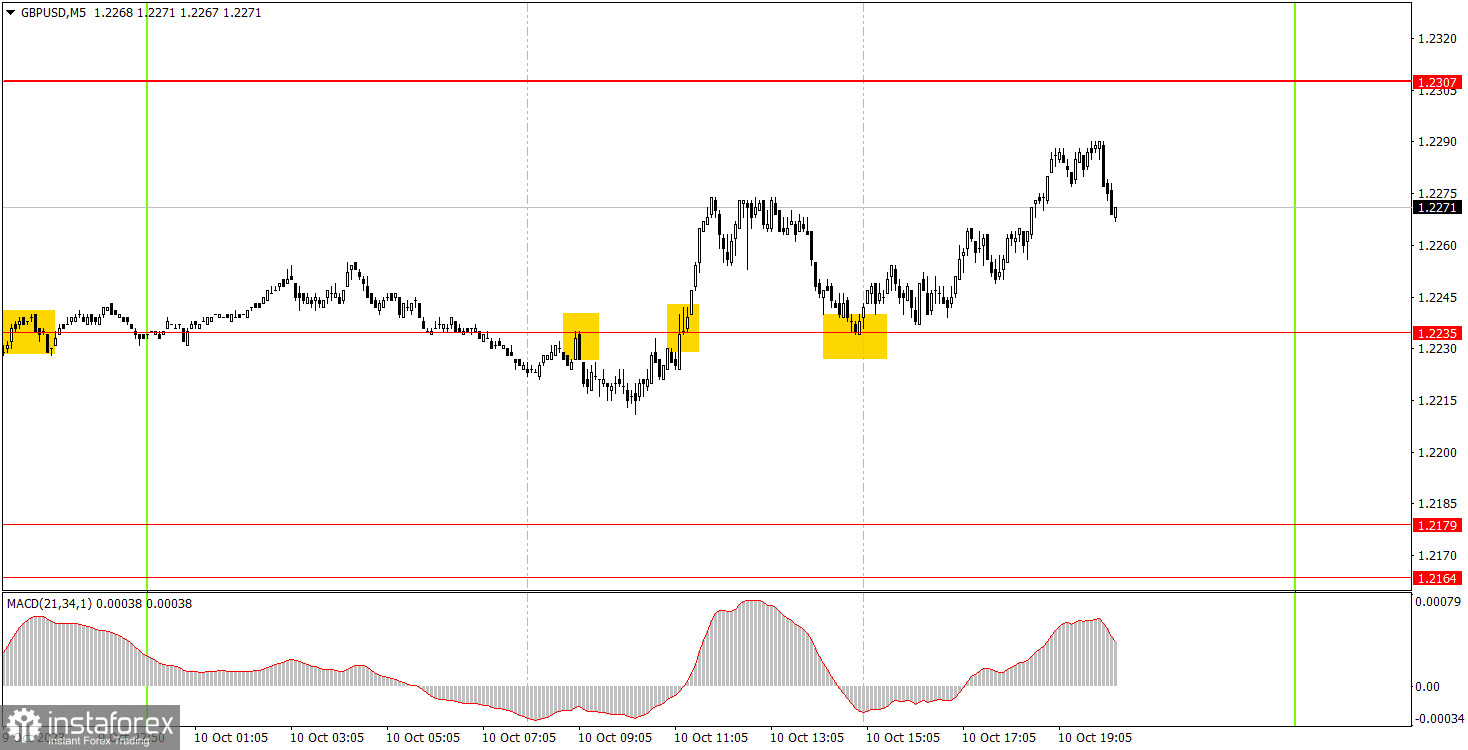Analysis of Tuesday trades:
GBP/USD 1H chart

By the end of the second day of the week, the GBP/USD pair continued its upward movement within the correction framework we anticipated. Today's macroeconomic or fundamental backdrop did not favor the rise of the British currency, but it was not required to. In previous articles, we have repeatedly stated that the correction is technical, meaning that there is no need for a fundamental basis for the pound to rise. The pair has been declining for over 2 months, losing 1,100 points, and is thus obliged to correct upward, especially since the descending trend line was breached.
Consequently, the correction may continue for several more days or even a couple of weeks. At present, it is quite challenging to specify its exact duration. The fundamental backdrop certainly does not currently support the euro or the pound, so in the medium-term perspective, we continue to anticipate a resumption of declines. The picture for the dollar could be marred by Federal Reserve representatives, who have recently begun discussing the non-mandatory tightening of monetary policy in November. Of course, these are just a few statements so far, but if there are more, the dollar will have more grounds to continue its decline.
GBP/USD 5M chart

On Tuesday, the signals for the British pound were not favorable, and neither was the volatility particularly high. High volatility hasn't been observed for quite a while, so substantial profit was not anticipated in any case. The first sell signal around the 1.2235 level turned out to be false. The price failed to move down 20 points, resulting in the trade closing with a slight loss. Subsequently, a buy signal was formed around the same level. This time, the pair managed to move 20 points in the correct direction, sufficient to set a break-even Stop Loss. However, it did not reach the target level of 1.2307, so the trade closed at Stop Loss. The third buy signal should not have been acted upon, as the first two proved to be false.
Trading idea for Wednesday:
On the hourly TF, the GBP/USD pair has commenced a new leg of its ascending correction, which has been ongoing for five days. The upward movement can continue even without fundamental and macroeconomic bases, given that the pound has been falling for two months. A substantial correction is now needed. We anticipate a resumption of the decline in the medium-term perspective in any case, as the pound has risen too long and with no good reason, but a correction is currently more logical. On the 5-minute TF tomorrow, the levels to consider are 1.1992-1.2010, 1.2052, 1.2107, 1.2164-1.2179, 1.2235, 1.2307, 1.2372-1.2394, 1.2457-1.2488, 1.2544, 1.2605-1.2620, 1.2653, and 1.2688. Upon the price moving 20 points in the correct direction after opening a trade, a break-even Stop Loss can be set. On Wednesday, there are important reports in the UK, while in the States, there will be the Fed meeting minutes, the Producer Price Index, and several speeches by Fed representatives. We believe that the correction will continue on Wednesday.
Basic rules of a trading system:
1) Signal strength is determined by the time taken for its formation (either a bounce or level breach). A shorter formation time indicates a stronger signal.
2) If two or more trades around a certain level are initiated based on false signals, subsequent signals from that level should be disregarded.
3) In a flat market, any currency pair can produce multiple false signals or none at all. In any case, the flat trend is not the best condition for trading.
4) Trading activities are confined between the onset of the European session and mid-way through the U.S. session, post which all open trades should be manually closed.
5) On the 30-minute timeframe, trades based on MACD signals are only advisable amidst substantial volatility and an established trend, confirmed either by a trend line or trend channel.
6) If two levels lie closely together (ranging from 5 to 15 pips apart), they should be considered as a support or resistance zone.
How to read charts:
Support and Resistance price levels can serve as targets when buying or selling. You can place Take Profit levels near them.
Red lines represent channels or trend lines, depicting the current market trend and indicating the preferable trading direction.
The MACD(14,22,3) indicator, encompassing both the histogram and signal line, acts as an auxiliary tool and can also be used as a signal source.
Significant speeches and reports (always noted in the news calendar) can profoundly influence the price dynamics. Hence, trading during their release calls for heightened caution. It may be reasonable to exit the market to prevent abrupt price reversals against the prevailing trend.
Beginning traders should always remember that not every trade will yield profit. Establishing a clear strategy coupled with sound money management is the cornerstone of sustained trading success.
 English
English 
 Русский
Русский Bahasa Indonesia
Bahasa Indonesia Bahasa Malay
Bahasa Malay ไทย
ไทย Español
Español Deutsch
Deutsch Български
Български Français
Français Tiếng Việt
Tiếng Việt 中文
中文 বাংলা
বাংলা हिन्दी
हिन्दी Čeština
Čeština Українська
Українська Română
Română

